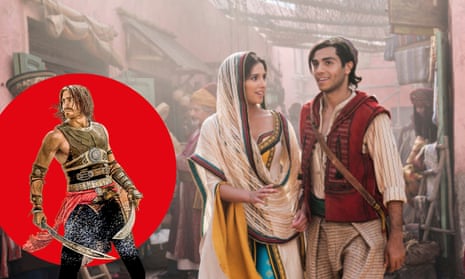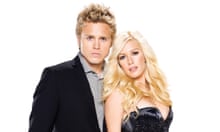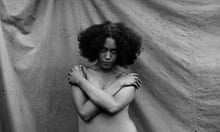A new Aladdin movie means a return to Hollywood’s perennial Arab problem, which in this case boils down the awkwardness of setting a family fairytale in a region that has been both vilified and bombed to ruin by the US in recent years. With Aladdin, the answer is to create a whole new world: a fantasy “Arabia” with as few references to Islam as possible or actual Arabs.
That all worked a treat with Disney’s 1992 animated Aladdin, featuring an all-white voice cast and set in the fictional city of Agrabah. Never mind some overt racism – such as the since-removed song lyric “Where they’ll cut off your ear if they don’t like your face / It’s barbaric but hey, it’s home” – it was still a huge hit.
This time round, Disney knows it has to be more careful. The new Aladdin, directed by Guy Ritchie, claims to be “one of the most diverse casts ever put on screen”. The lead is played by the Egyptian-Canadian Mena Massoud; Jasmine is played by British actor Naomi Scott, who is of Indian descent; and Will Smith is a blue genie from the Uncanny Valley.
Disney has form in whitewashing Middle Eastern characters – remember Jake Gyllenhaal as the “Prince of Persia”? – but it is far from the only culprit. See also: Liam Neeson as Batman’s adversary Ra’s al Ghul, Geoffrey Rush and Gerard Butler as Gods of Egypt, or Christian Bale as Moses. Actually, if we’re talking Middle Eastern ethnicities, see pretty much every biblical movie.
But it is not only the casting, it’s the settings; and Disney has form in this area, too. Like the 1932 cartoon Mickey in Arabia, in which the locals are all “sambo” caricatures: jet-black skin, giant white lips, big eyes. These orientalist lands take a swathe of diverse “eastern” cultures and smoosh them into something homogenous: camels, turbans, swords, sand, “mystery and enchantment”; no Muslims, thanks. The new Aladdin’s Bollywood-meets-the-Middle East setting looks like the themed area of Disneyland it is destined to become. It is an impression that often sticks in the mind of outsiders. In a 2015 poll, 30% of Republican voters supported the US bombing of Agrabah.
Then again, who’s to say this fictional Agrabah can’t contain white foreigners or mixed-race people, such as the Anglo-Indian Jasmine? It’s not as though there’s a solid reference point. The “original” tale was recorded by an 18th-century Frenchman who heard it from a Syrian. It was set in China, although there is nothing in it to suggest its Arab narrator had actually been there. You could say that Aladdin was an orientalist fantasy to start with. By definition, fantasy locations cannot conform to reality, but they often conform to their creators’ prejudices. Let’s see where Disney’s and Ritchie’s take Aladdin. After that, we’ve still got the Mulan remake to look forward to.
Aladdin is out on Wednesday 22 May
Comments on this piece are premoderated to ensure discussion remains on topics raised by the writer. Please be aware there may be a short delay in comments appearing on the site.











Comments (…)
Sign in or create your Guardian account to join the discussion